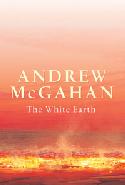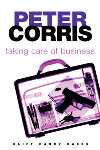The two books by Australian writers that have been getting a lot of review time around the world so far this year have been: Wrong About Japan by Peter Carey, and Seven Types of Ambiguity by Elliot Perlman. You can understand Carey receiving this attention, he's a world-class writer who's won the Booker prize twice. Perlman, on the other hand, is just starting out, and this is only his third book, and second novel. I've covered the Carey here from time to time, though if you want a good smattering of the reviews all in one spot then I'd suggest checking out The Complete Review - they rated it a B, which seems about right to me.
Given that Seven Types of Ambiguity is an Australian novel it seems only fair that it should have been published here first, though it might come as a bit of shock to some people to consider how long ago it first appeared. Peter Craven led off the review rounds of the novel with a major piece published in the "Australian Book Review" (scroll down a fair way) of November 2003. Craven is not one to beat about the bush hinting at his opinions - he tends to come straight out and state what he thinks. And, on this occasion, he leaves you in no doubt right from the off by titling his review "A Blander Shade of Grey".
It was a bit ridiculous that a book of fiction [Perlman's previous novel Three Dollars] of rather manifestly modest literary ambitions should be published as the crême de la crême of literary fiction and then pretty much accepted as such. Perlman's new book confounds the pretension and makes it well and truly the author's own by purloining the title of one of the twentieth century's greatest works of literary criticism and adding insult to injury by calling the protagonist's dog Empson.And after that Craven really lets rip, referring to the "monstrously bombastic writing" and calling it "an overblown example of popular writing." He's not a happy reviewer and leaves you in no doubt of where he stands.
"The New York Metro" considered that "Elliot Perlman's Seven Types of Ambiguity, which comes to us hailed as 'Australia's equivalent of Jonathan Franzen's The Corrections, is so bad, so incompetent, and so long, there must be broad historical currents involved." Hailed by the publishers methinks. Are reviewers believing publishers' blurbs now?
And continuing the negative reviews, "The Seattle Times" came to the conclusion that "Perlman's people are so damn miserable: self-involved, repressed, eady to blame anyone but themselves - or, the flip side, damaged saints in modern clothes." "The Washington Post" tends to be a little more balanced: "By its final chapter, Seven Types of Ambiguity seems to realize that it has indulged its metafictional fetish at the expense of its obligation to tie up loose ends. Resolution comes hurriedly -- perhaps a shade too hurriedly given our 600-page investment. At the same time, the reader can't help but be impressed. Elliot Perlman has many things working in his favor as a novelist: curiosity, erudition, daring and a gift for seducing readers into going along with him for the ride. He'll get you where you want to go, eventually, but you'll have to forgive him his scenic detours."
"The International Herald-Tribune" finds that "...the reader plunges into Seven Types of Ambiguity braced for cleverness, acuity and innovation. And Perlman fulfills some of these expectations. He also circles endlessly around the same ideas, events and characters until the repetition becomes more exhausting than illuminating."
To finish off on a higher note, "The Guardian" enthuses that "Perlman's novel is a colossal achievement, a complicated, driven, marathon of a book." And Kirkus Reviews sees "Constant love in the face of terrible odds - such is the old-fashioned but deeply satisfying theme in a thoroughly modern Australian import...Long enough to tell everything that needs to be told, but never ponderous and never overdone. George Eliot down under."


